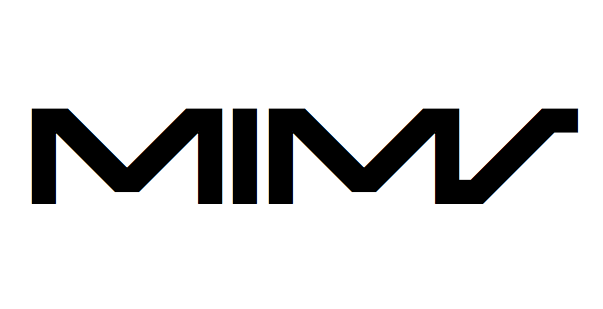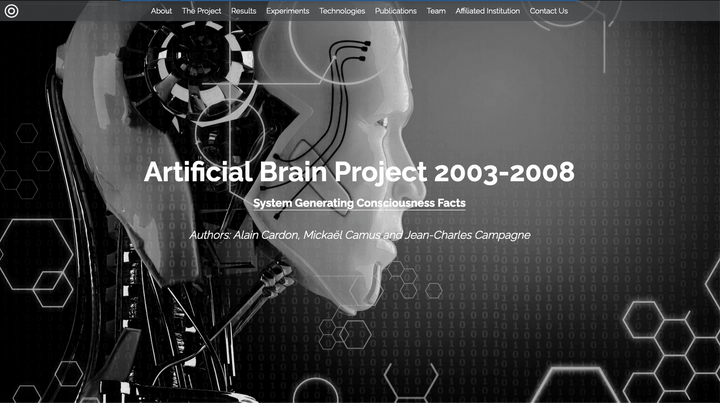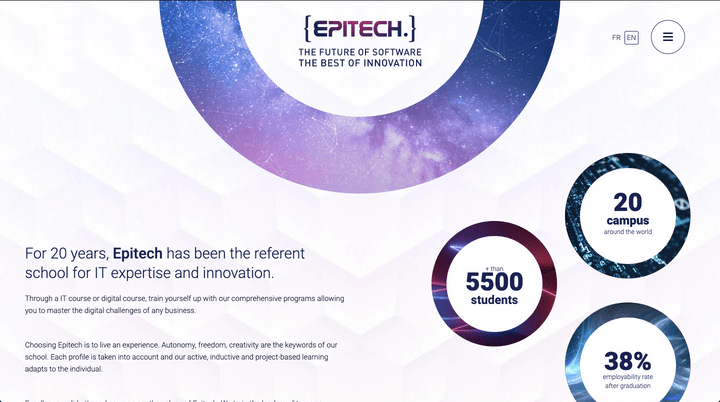

Mickaël Camus
Computer Scientist in transparent, scalable and distributed AI
My interest
How to build a new kind of information processing. You will no longer need programming languages as we know them.
During my PHD Thesis (2003-2007), supervised by Pr. Alain Cardon in LIP6 from P6, I developed a system capable of modifying its internal structure itself according to its objectives, its input data and its knowledge, all in a totally transparent way. That allows one to generate models in real-time. The core of this system is a goals oriented massive multi-agent system. This discovery is as a master algorithm to control machines at a knowledge level (A. Newell). It is a possible core to the development of a computational model for an artificial general intelligence and an artificial consciousness.
I address this problem with a philosophical and constructivist approach. The goal is not to copy the human nervous system or implement a specific cognitive model but to work on this question: what are humans capable of doing thanks to their consciousness? The main goal is to build a system capable of generating questions itself, and behaving according to its assumptions in the real world. To resume, build an artificial consciousness, not a Human artificial consciousness.
Why to build an artificial consciousness ? We have cognitive system services thanks to several industrials, we have deep learning tools thanks a batch of brilliant scientists. But these discoveries don't solve the fact that a human is able to transposing a solution of a problem to a different problem, a human doesn't need to learn 30 millions of patterns to do something. That is to say there is a way to use less energy to solve problems and there is a way to fully control in real-time what an autonomous system does and what will it do instead of a black box.
Download My PHD Thesis in french
Système auto-adaptatif générique pour le contrôle de robots ou d'entités logicielles
awards
- 2021, AI Innovation award granted by ADRIQ - My Intelligent Machines
- 2021, company of the year granted by Anges Québec - My Intelligent Machines
- 2020, Google for startups Accelerator - My Intelligent Machines
- 2020, Red Herring Top 100 North America - My Intelligent Machines - https://www.redherring.com/events/rhna/2020-red-herring-top-100-north-america-winners/
- 2019, My Intelligent Machines R&D is supported by the National Research Council Canada
- 2014-2015, Azzimov R&D is supported by the National Research Council Canada
- 2012, Red Herring 100 Winner Global - Azzimov - http://www.redherring.com/events/red-herring-global/2012-top-100-global-winners/
- 2007, PhD defense succeeded, with honors from the jury- https://www.lip6.fr/actualite/personnes-fiche.php?ident=D532&LANG=en
- 2002-2003, the movie Winged Migration won a César and has been nominated for an Oscar. We developed an Artificial Incubator System for the birth of different species of birds.
Publications
27 publications including 3 re-editions in journals or books.
Recent publications
- Distributed and transparent intelligent information system to monitor the health of astronauts and their surrounding environment, M. Camus, S. Jenna and A. B. Diallo. Canada Reaches for the moon, 2021 Canadian Lunar Workshop- https://virtual.oxfordabstracts.com/#/event/2156/poster-gallery/grid?sort=titles¤t=71
- Auto-adaptive learning for life science, M. Camus. 32nd Canadian Conference on Artificial Intelligence, Canadian AI 2019, Advances in Artificial Intelligence, Springer, May 28-31, 2019.
Journals with blind review
- Testing the attention capacities of a complex auto-adaptive system: a Stroop Task simulation, O. Larue, P. Poirier, M. Camus. Journal of Experimental and Theoretical Artificial Intelligence (JETAI 2011).
- Knowledge Organization Using Shapes Extraction from Web Pages in an Auto-Adaptive System, C. Havas, O. Larue and M. Camus. WSEAS Transaction on Systems, Issue 5, Volume 7, Included in ISI/SCI Web of Science and Web of Knowledge, May 2008.
- Emotions Generation and Knowledge Organization in an Auto-Adaptative System using Shape and Color Recognition, C. Havas, O. Larue and M. Camus. Applied Computer & Applied Computational Science 2008 (ACACOS'08), Invited paper, WSEAS Transactions and NAUN journal, a springer verlag volume, Included in ISI/SCI Web of Science and Web of Knowledge, China, 2008.
- Generic Simulator Environment for Realistic Simulation - Autonomous Entity Proof and Emotion in Decision Making. M.Camus and N. El Kadhi in Journal of Systemics, Cybernetics and Informatics, Volume 2, Number 2, 2004.
Book Chapters
- Towards emotional decision-making, M. Camus, A. Cardon. Innovative Concepts for Autonomic and Agent-Based Systems, NASA Goddard Space Flight Center, september 2005, LNAI 3825, Springer, 2007.
- A self-adapting system generating intentional behavior and emotions, A. Cardon, J.C. Campagne, M. Camus. Innovative Concepts for Autonomic and Agent-Based Systems, NASA Goddard Space Flight Center, september 2005, LNAI 3825, Springer, 2007.
Conferences with blind peer review
- Auto-adaptive learning for life science knowledge, M. Camus, 32nd Canadian Conference on Artificial Intelligence, industry track, May-28-31, Queen's University, 2019, Kingston, Ontario.
- Simulating cognitive phenomena with a symbolic dynamical system, O. Larue, P. Poirier, M. Camus. 20TH Annual Conference on Behavior Representation in Modeling Simulation (BRIMS 2011).
- Testing the attention capacities of a complex auto-adaptive system: a Stroop Task simulation, O. Larue, M. Camus, P. Poirier. The 23rd International FLAIRS Conference, special track Cognition and AI: Capturing Cognitive Plausibility and Informing Psychological Processes, Daytona Beach, Florida, USA, May 19-21 2010.
- Knowledge Extraction from Web Pages with an Auto-Adaptive System, C. Havas, O. Larue and M. Camus. Invited Speaker, 12th CSCC, Included in ISI/SCI Web of Science and Web of Knowledge, Heraklion, Crete, Greece, July 22-25,2008.
- Morphology Programming with an Auto-Adaptive System, M. Camus. Invited paper, accepted as Research Report at the 2008 International Conference on Artificial Intelligence, ICAI'08, WorldComp'08, Las Vegas, Nevada, USA, 2008.
- Emotions Generation and Knowledge Organization in an Auto-Adaptative System using Shape and Color Recognition, C. Havas, O. Larue and M. Camus. Applied Computer & Applied Computational Science 2008 (ACACOS'08), Invited paper, WSEAS Transactions and NAUN journal, a springer verlag volume, Included in ISI/SCI Web of Science and Web of Knowledge, China, 2008.
- Knowledge organization with pattern recognition in an auto-adaptative system, C. Havas, O. Larue and M. Camus. Artificial Intelligence, Knowledge Engineering and Data Bases 2008 (AIKED'08), Included in ISI/SCI Web of Science and Web of Knowledge, University of Cambridge (UK), 2008.
- An adaptive system to control robots: ontology distribution and treatment, M. Camus, A. Cardon. The 6th WSEAS International Conference on Simulation, Modeling and Optimization, Included in ISI/SCI Web of Science and Web of Knowledge, Lisbon, Portugal, September 22-24, 2006.
- Dynamic programming for robot control in real-time: towards a morphology programming, M. Camus, A. Cardon. The 2006 International Conference on Artificial Intelligence. Monte Carlo Resort, Las Vegas, Nevada, USA, 2006.
- FOURMIS RDNFS, Redundant Distributed Network File System,Y. Torrent, F. Heng ngi, C. Franco, M. Camus, F. Daira, N. Daira, B. Ferrier, S. Valsemey. SCI 2004, Orlando, Florida, 2004.
- Generic Simulator Environment for Realistic Simulation. M. Camus and N. El Kadhi, Best paper SCI 2003, Orlando Florida, 2003.
- Collecte d'informations pertinentes et sécurisés sur Internet. M. Camus, L. Auroux, D. Gousseau: SECI02, Tunis. Organiser par le CCK (Tunisie) et l’INRIA (France), 2002.
Workshops with blind peer review
- Towards emotional decision-making, M. Camus, A. Cardon,Second GSFC/IEEE WRAC 2005 : Workshop on Radical Agent Concept, NASA Goddard Space Flight Center, 2005.
- A self-adapting system generating intentional behavior and emotions, A. Cardon, J.C. Campagne, M. Camus, Second GSFC/IEEE WRAC 2005 : Workshop on Radical Agent Concept, NASA Goddard Space Flight Center, 2005.
- Autonomous Systems for Space Missions: An Application with Athena, M. Camus. Axlog ingenierie, ESA, NASA, Netherlands, October 2002.
PHD thesis and Misc
- Système auto-adaptatif générique pour le contrôle de robots ou d'entités logicielles, M. Camus, Université Pierre et Marie Curie, thèse de doctorat, 2007.
- Simulation Réaliste et Traitement Intelligent, M. Camus, rapport d'avancement, LIP6 UMR 7606 - UPMC, 2005.
- Thesis proposal: Simulation Réaliste et Traitement Intelligent, M. Camus, LIP6/CNRS , 2003.
- MISURE - MIssion management System for Uninhabited aiR vEhicles and new techniques : PLANIFICATION ANYTIME, M. Camus, Technical report, {Epitech.}, mémoire de fin d'étude, 2002.
- Incubation Assistée par Ordinateur, P. Terrand, M. Camus, M. Bordeau, in ``Le Peuple Migrateur'', Galatée Film, 2001.
- Serveur de synchronisation pour application mobile, M. Camus, Technical report, Inexware R&D, 2000.
The Blog
Science, engineering and other subtleties
May 13, 2015February 20, 2015Symbolic System
Artificial Brain GUI: COntrol an aibo
Portfolio
I created and developed, with great teams, some technologies, this is a selection..
A multi-task artificial intelligence (2016-...)
MIMs platform helps Bio-Pharma and Agritech companies use bioinformatics, systems biology and machine learning to leverage their massive OMIC, clinical/phenotypical and environmental data to maximize R&D and production.
A robot in the cloud (2011-2015)
Daneel is a cognitive system built with a goal-oriented organizational memory. The entire mechanism of this system follows the laws of an auto-adaptive system. These laws give plasticity and dynamism to the intelligent system. These features are crucial for managing different abstraction layers in a symbolic system. Multiple contexts and different meanings are taken in account when users discuss with Daneel. Whatever the user is asking, Daneel uses its own knowledge to answer or to discuss with the user using a natural language. We are in an industrial transition: in this new era, developers will program some behaviour, which will integrate in a cognitive system, instead of programming some applications put in a global market. That’s mean that data are merged with algorithms: we work at the knowledge level.

System Generating Consciousness Facts (2003-2008)
The aim of our researches is the fine transposition of the brain activity in the computable science, and not only a partial simulation of the reasoning domain. The final product is the construction of a general system producing artificial mental representations: that is a software system producing artificial consciousness facts.
Create some crazy projects and work with awesome students (2002-2008)
Courses: Artificial Intelligence (expert systems, neural networks, multi-agent system, genetic algorithm and game theory), Concurrent Programming and Kernel Programming.
- Gomoku game for the game theory and the multi-agent systems
- Expert system generator
- Fingerprint recognition software for the neural networks
- Simulation software for the genetic algorithm
- Linguistic bot for the concurrent programming
- Kernel programming: a memory allocation by network, a trigger for a file system, a new system call in the operating system
- Design and development of a micro-kernel: bootstrap, virtual memory, scheduler. All these features on a x86 CPU architecture.
Manage birds birth in real-time (1998-2001)
The AIS is an Artificial Incubation Software to manage birth of multiple species in real-time. Plugged to a calliper, a balance and an ontology, this software allowed the expert to control the birth rate of multiple species.
drop me a message
If you have any questions about Artificial Consciousness or Master Algorithm
© Mickaël Camus 2025


